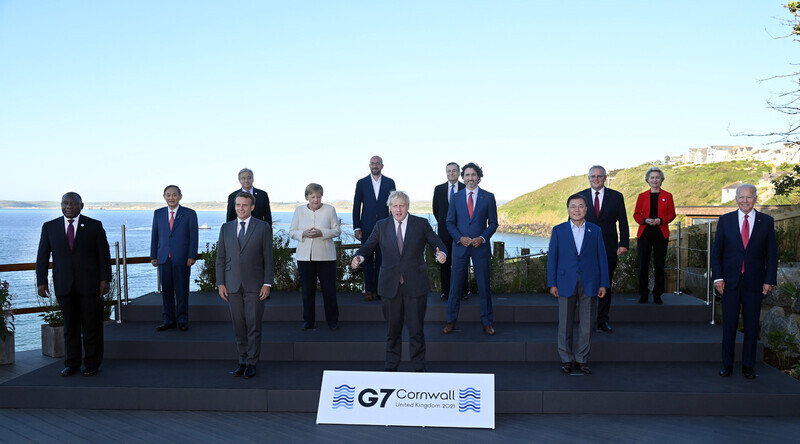hankyoreh
Links to other country sites 다른 나라 사이트 링크
[Column] New normal in S. Korea-China relations


By Park Min-hee, editorial writer
The G7 summit last weekend may have looked like a cheerful party, but it was actually a sharp diplomatic scuffle. The seven national leaders produced the joint statement after a fierce debate was stuffed with messages aimed at containing China. Those messages covered the full spectrum from Taiwan, Xinjiang and Hong Kong to another investigation of the origins of COVID-19 and countermeasures for China’s state-led economy and its Belt and Road Initiative.
While the G7 countries may differ in their attitude about how strong a response is needed for the problems created by the rapid rise of China, they sent an unmistakable signal that they share a general understanding of those problems and intend to make some response.
The US is attempting to define its conflict with China as a confrontation between democracy and authoritarianism, but in reality, it’s a no-holds-barred struggle for supremacy between the hegemon and the challenger.
Amid that conflict, pushback to China is spreading around the world, and China only has itself to blame for that.
Given China’s plan to become the world’s most powerful country by 2049, it has an obligation to propose an alternative world order in line with that plan.
But what has China shown the world? At home, China has created a “big brother surveillance society” that squashes dissenting voices. And abroad, China has adopted “wolf warrior” diplomacy that attempts to manipulate other countries with money and power.
The Blue House widely promoted a photograph of President Moon Jae-in standing alongside the G7 leaders, which it described as representing South Korea’s current status. But when asked about the G7 joint statement’s criticism of China, a Blue House spokesperson pointed out that “since President Moon is an observer at the G7, rather than a member, he neither helped draft the statement nor signed it.”
That’s reminiscent of what happened after South Korea and the US made their first mention of “the importance of preserving peace and stability in the Taiwan Strait,” an extremely touchy topic for China, in a joint statement following their summit last month. South Korean Foreign Minister Chung Eui-yong sought to downplay the significance of the passage, which he said was “only abstract and theoretical.”
Right after participating in an international meeting aimed at jointly responding to the China issue, South Korea promptly reassured China that “that’s not what we meant.”
No doubt, South Korea’s moves reflect the importance of the Korean Peninsula peace process and South Korea’s economic relationship with China.
But Korea really ought to stake out clear principles and demonstrate its commitment to taking responsibility for its decisions at a time of rapid changes in the world order. Otherwise, Korea’s international credibility is sure to falter even as it brags about entering the ranks of the G10.
It’s time to face the reality of the “new normal” in South Korea-China relations. Their relationship rapidly deteriorated following China’s retaliatory measures against South Korea’s deployment of the THAAD missile defense system in 2016, but the fundamental problem was a seismic shift on a larger scale.
While South Korea and China have close economic ties, they’re competing, rather than cooperating, in an increasingly broad range of areas, including cutting-edge technology. And under Xi Jinping, China has made clear its goal of becoming the hegemon and fostered aggressive patriotism, creating conditions that are bound to instigate conflict with neighboring countries, including Korea.
Some Koreans hope that a visit by Xi Jinping would restore South Korea-China relations to the way they were before THAAD, but that’s a pipe dream.
Koreans are deeply divided about whether they can consent to a China-led order along the lines currently shown by China. Even as the government has studiously avoided this question, anti-Chinese public opinion has surged to the highest level in history, and the domestic conflict over the China question has occasionally been exploited for political purposes. The time has come for South Korea to analyze changes in China accurately and calmly frame a new direction for foreign policy toward China that will be appropriate for the “new normal” in its relations with China.
To help establish a coalition of countries that can ease tensions in the “new cold war” between the US and China because they aren’t aligned with either side, South Korea needs to express its principles clearly. In a recent meeting with South Korean officials, German diplomats and defense officials reportedly expressed interest in s policy toward China and observed that the two countries have a similar position toward China.
China is a key export market for both South Korea and Germany, and both countries have sought to maintain balance between the US and China.
But the German government has repeatedly brought up the situation in Xinjiang and Hong Kong in its diplomacy with China. At the same time, it has made clear to the international community that it will keep cooperating with China on economic matters and climate change.
Rather than staying mum about China’s problems, South Korea needs to pursue a strategy of expounding a principle of “criticism and cooperation” while seeking to expand cooperation with countries that could share that principle.
Seoul ought to keep indicating to China that it will maintain cooperation but that it can’t agree with certain aspects of the current Chinese order and that it hopes China will offer a more positive alternative. Koreans need to face the new normal in our relationship with China if we’re to find a better modus vivendi for our two countries.
Please direct comments or questions to [english@hani.co.kr]

Editorial・opinion
![[Column] Park Geun-hye déjà vu in Yoon Suk-yeol [Column] Park Geun-hye déjà vu in Yoon Suk-yeol](https://flexible.img.hani.co.kr/flexible/normal/500/300/imgdb/original/2024/0424/651713945113788.jpg) [Column] Park Geun-hye déjà vu in Yoon Suk-yeol
[Column] Park Geun-hye déjà vu in Yoon Suk-yeol![[Editorial] New weight of N. Korea’s nuclear threats makes dialogue all the more urgent [Editorial] New weight of N. Korea’s nuclear threats makes dialogue all the more urgent](https://flexible.img.hani.co.kr/flexible/normal/500/300/imgdb/original/2024/0424/7317139454662664.jpg) [Editorial] New weight of N. Korea’s nuclear threats makes dialogue all the more urgent
[Editorial] New weight of N. Korea’s nuclear threats makes dialogue all the more urgent- [Guest essay] The real reason Korea’s new right wants to dub Rhee a founding father
- [Column] ‘Choson’: Is it time we start referring to N. Korea in its own terms?
- [Editorial] Japan’s rewriting of history with Korea has gone too far
- [Column] The president’s questionable capacity for dialogue
- [Column] Are chaebol firms just pizza pies for families to divvy up as they please?
- [Column] Has Korea, too, crossed the Rubicon on China?
- [Correspondent’s column] In Japan’s alliance with US, echoes of its past alliances with UK
- [Editorial] Does Yoon think the Korean public is wrong?
Most viewed articles
- 1‘We must say no’: Seoul defense chief on Korean, USFK involvement in hypothetical Taiwan crisis
- 2Will NewJeans end up collateral damage in internal feud at K-pop juggernaut Hybe?
- 3[Column] Park Geun-hye déjà vu in Yoon Suk-yeol
- 4Why Korea shouldn’t welcome Japan’s newly beefed up defense cooperation with US
- 5Thursday to mark start of resignations by senior doctors amid standoff with government
- 6N. Korean hackers breached 10 defense contractors in South for months, police say
- 7[Guest essay] The real reason Korea’s new right wants to dub Rhee a founding father
- 8[Column] ‘Choson’: Is it time we start referring to N. Korea in its own terms?
- 9Kim Jong-un expressed ‘satisfaction’ with nuclear counterstrike drill directed at South
- 10[Editorial] New weight of N. Korea’s nuclear threats makes dialogue all the more urgent